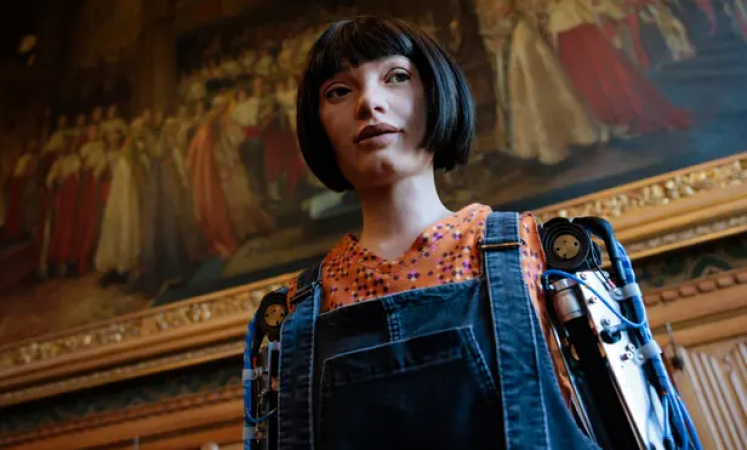
UK: The House of Lords may have hoped to shake its sleepy reputation when it announced that "the world's first robot artist" would testify before a parliamentary committee.
Unfortunately, when the Ai-da Robot arrived at the Palace of Westminster on Tuesday, it seemed he was doing just the opposite. The machine, which looks like a sex doll tied to a pair of eggs, broke away from the stuffy environment and shut down halfway during the testimonial session.
The device's creator, Aidan Mailer, put a pair of sunglasses on the machine as he worked with the power sockets to restart it. "She can sometimes draw quite interesting faces when we reset her," he explained.
Also Read: Surface Pro 9 with 12th generation Intel CPUs and optional 5G support was unveiled.
The subsequent headlines were unlikely to be what the Lord's Communications Committee had expected when inviting Mailer and his creation to testify as part of an investigation into the future of Britain's creative economy.
However, AI-da is part of a long line of humanoid robots that have dominated conversations about artificial intelligence by looking only the part, even though the technology that powers them is far from cutting-edge.
"Committee members and roboticists are aware that they are all part of a hoax," said Jack Stilgo, an academic at University College London who studies emerging technology governance.
"We learned from this evidence only by hearing that some people actually like puppets." There was very little intelligence on display - artificial or otherwise.
"If we want to learn about robots, we have to go behind the scenes and listen to roboticists, not robots." Instead of being swayed by computer pretense, we need roboticists and computer scientists to help us understand what they can't.
There are legitimate concerns about AI and the arts, as to who really benefits. Who owns the creative process? How can the creators of AI raw materials, such as Dell-Dataset E, be properly credited to millions of previous artists? Instead of helping Ai-da, this discussion is being tarnished."
Stilgo was not the only one who mourned the missed opportunity. "I can only imagine that ai-da has many purposes, many of which could be good," said Sami Kasky, professor of artificial intelligence at the University of Manchester.
"Unfortunately, it appears that the public stunt failed this time and made the wrong impression." And if expectations were too high, anyone watching the demo could conclude, "Oh, this field doesn't work, this technology doesn't work in general."
According to Mailer, the ai-da is "not a deception, but a reflection of our own current human attempts to understand and imitate the human condition." The artwork encourages us to consider these social trends and their moral implications critically.
Also Read: Labour promises low-income families a low-cost broadband tariff
"Aye-da is Duchampion, part of a contemporary art discussion, and follows in the footsteps of Andy Warhol, Nam June Pike and Lynn Hershman Lesson, all of whom have explored the humanoid in their work."
Ai-da belongs to the Dada movement, which questioned the concept of 'art'. Ai-da, in turn, questions the concept of "artist". While good contemporary art can be controversial, our overall goal is to encourage a broad and thoughtful conversation."
As the Lords Committee heard just before AI-da, AI technology is already making a significant impact on the UK's creative industries – just not in the form of humanoid robots.
"There has been very clear progress, especially in the last few years," said University of Sussex academic Andres Guadamuz. "Things that were not possible seven years ago, the potential of artificial intelligence is on an entirely different level." Things have changed in the last six months, especially in the creative industries."
Guadamuz appeared with representatives from Equity, the Performers Union and the Publishers Association, all of whom discussed how recent advances in AI capability could have real-world consequences.
Equity's Paul Fleming, for example, has raised the possibility of synthetic performance, where AI is already "directly affecting" actors' positions.
"For example, why include multiple actors to put together all the movements that go into a video game when you can mine data independently?" And getting out is extremely difficult, especially for one person."
If an AI can simply watch a given actor's performance and create walkable character models like them, that actor may never work again.
The same risks exist for other creative industries, according to Dan Conway of the Publishers Association, and the UK government is exacerbating them.
"In UK law, there is a research exception... Currently, the legal provision allows any of those businesses of any size, located anywhere in the world, to access all of my members' data for free for the purposes of text and data mining.
Also Read: Renault is looking for a new partner for create new vehicles with internal combustion engines
There is no distinction between a large US tech firm in the United States and a small AI startup in the north of England." The process, dubbed "AI data laundering" by technologist Andy Baio, is how a company like Meta can train its video-creation AI using 10 million video clips scraped for free from the internet.
The Lords will continue their investigation into the future of the creative economy. There are no more physical or virtual robots scheduled to testify.